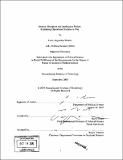Secrecy, deception and intelligence failure : explaining operational surprise in war
Author(s)
Waters, Lonn Augustine
DownloadFull printable version (4.778Mb)
Other Contributors
Massachusetts Institute of Technology. Dept. of Political Science.
Advisor
Barry Posen.
Terms of use
Metadata
Show full item recordAbstract
Operational surprise attacks are large-scale, theater-level intrawar attacks, which result from a country misestimating the capabilities and intentions of its enemies. This thesis analyzes how these massive surprise attacks occur during war when countries should be especially wary of their enemies and vigilant for any evidence of attack. Three hypotheses may explain the frequency and success of operational surprise attacks including operational secrecy, strategic deception, and intelligence failure. Using the Battle of the Bulge in World War II and the Chinese counteroffensive in the Korean War as case studies, this analysis illustrates these three elements and evaluates their relative causal weight in these attacks. This study concludes that each hypothesis is a contributing element to the surprise attack, but that a failure of intelligence is the critical factor. Moreover, this failure stems from a "victory disease" - a belief held by military leaders and their intelligence staff when victory appears near that one's enemy is too weak or has allowed the opportunity to mount a successful counterattack pass. (cont.) Thus, precisely when one's enemy becomes most desperate on the battlefield countries run a greater risk of surprise attack by failing to accurately estimate an enemy's strategic intentions and military capabilities.
Description
Thesis (S.M.)--Massachusetts Institute of Technology, Dept. of Political Science, 2005. Includes bibliographical references (leaves 83-85).
Date issued
2005Department
Massachusetts Institute of Technology. Department of Political SciencePublisher
Massachusetts Institute of Technology
Keywords
Political Science.